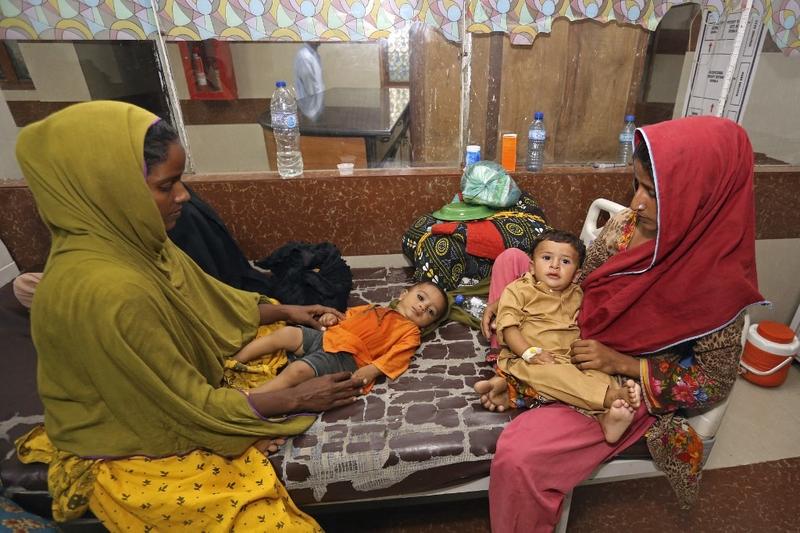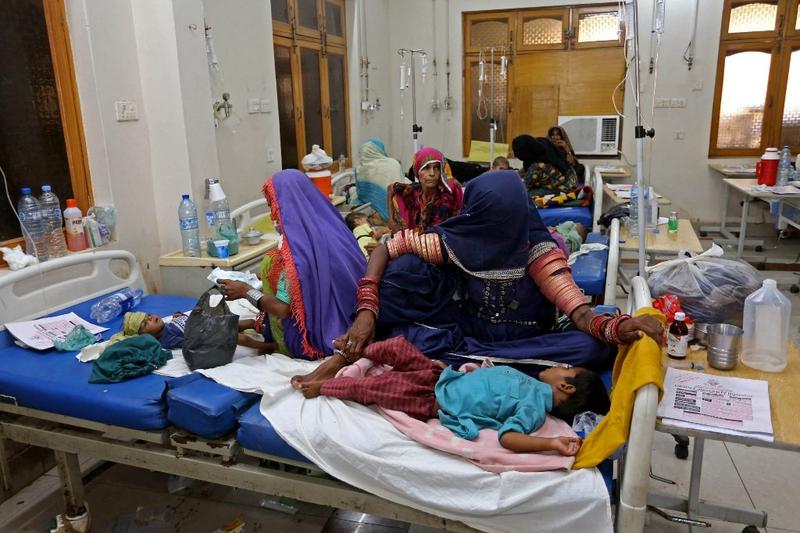 Internally displaced people take care of their children under treatment for malaria and gastro in the flood-hit Hyderabad city of Sindh province on Sept 11, 2022. (AKRAM SHAHID / AFP)
Internally displaced people take care of their children under treatment for malaria and gastro in the flood-hit Hyderabad city of Sindh province on Sept 11, 2022. (AKRAM SHAHID / AFP)
KARACHI, PAKISTAN - The death toll from malaria and other diseases tearing through Pakistan's flood-ravaged regions reached 324, authorities said on Wednesday, and actress Angelina Jolie said she feared many people she had met during visits to flood-hit areas this week would "not make it" if more aid did not arrive.
Hundreds of thousands of people displaced by the floods were living in the open. Stagnant floodwaters, spread over hundreds of kilometers, may take two to six months to recede. Already they have led to widespread cases of skin and eye infections, diarrhea, malaria, typhoid and dengue fever.
READ MORE: Children, women suffer from diseases in flood-hit Pakistan
Hollywood actress and humanitarian Jolie had visited people displaced by the floods with international aid organization IRC in an effort to raise awareness. She saw some of the worst affected areas in southern Sindh province.
Authorities and aid workers have said more immediate help is needed for displaced families exposed to swarms of mosquitoes and other hazards, such as snake and dog bites
"I've seen those lives who were saved," she said but added that without sufficient aid, others "won't be here in the next few weeks, they won't make it." Her comments, made when visiting the country's flood response center, were carried on video footage shared by the country's military on Wednesday.
Authorities and aid workers have said more immediate help is needed for displaced families exposed to swarms of mosquitoes and other hazards, such as snake and dog bites.
Despite the efforts of the government and local and foreign relief organizations, many people are in dire need of food, shelter, medical assistance and medicines.
With Pakistan's already weak health system and lack of support, displaced families have complained of being forced to drink and cook with unsafe water.
READ MORE: Pakistan races to keep floodwaters out of vital power station
"We know it can sicken us, but what to do, we have to drink it to stay alive," flood victim Ghulam Rasool told local Geo News TV as he stood near where his home was washed away in southern Pakistan.
A historic and intense monsoon dumped about three times as much rain as Pakistan's three-decade average. Combined with glacial melt, this caused unprecedented flooding.
The deluge, which scientists say was exacerbated by climate change, has affected nearly 33 million people in the South Asian nation of 220 million. It has swept away homes, crops, bridges, roads and livestock in damages estimated at US$30 billion.
"I've never seen anything like this ... I'm overwhelmed," said Jolie, who has made several trips to Pakistan including after deadly floods in the country's south in 2010.
"The aid is slow to arrive," said Dr Farah Naureen, Mercy Corps' country director for Pakistan, after visiting several submerged regions.
"We need to work in a coordinated manner to respond to their immediate needs," she said in a statement late on Monday, prioritizing clean drinking water. Health and nutrition stand out as the most important needs of the displaced population, she said.
 Internally displaced people take care of their children under treatment for malaria and gastro in the flood-hit Hyderabad city of Sindh province on Sept 11, 2022. (AKRAM SHAHID / AFP)
Internally displaced people take care of their children under treatment for malaria and gastro in the flood-hit Hyderabad city of Sindh province on Sept 11, 2022. (AKRAM SHAHID / AFP)
Pakistan's finance ministry said it had approved 10 billion rupees (US$42 million) for the disaster management agency to use for procuring flood relief supplies and other logistics.
ALSO READ: UN chief appeals for 'massive' help for flooded Pakistan
France plans to host an international conference this year on climate-resilient reconstruction of Pakistan's flood-affected areas.
The announcement came after Pakistani Prime Minister Muhammad Shehbaz Sharif and French President Emmanuel Macron had a bilateral meeting on the sidelines of the 77th Session of the UN General Assembly (UNGA) in New York, said a statement issued by Pakistan Ministry of Foreign Affairs.
Fast spread
The Sindh provincial government said makeshift health facilities and mobile camps in flooded areas had treated more than 78,000 patients in the last 24 hours, and more than 2 million since July 1. Six of them died, it said.
The Sindh provincial government confirmed that 665 new malaria cases among internally displaced families over the same period, with another 9,201 suspected cases
It confirmed 665 new malaria cases among internally displaced families over the same period, with another 9,201 suspected cases. It said a quarter of the more than 19,000 patients screened in the last 24 hours across the province were positive, a total of 4,876.
READ MORE: COVID inoculation campaign for children begins in Pakistan
United Nations Pakistan said malaria, typhoid and diarrhea cases were spreading quickly, adding 44,000 cases of malaria were reported this week in the southern province.
Director General Health Services for southwestern Balochistan province, Noor Ahmed Qazi, said malaria was spreading quickly in regions around stagnant waters.
"We're receiving malaria patients in large numbers on a daily basis in medical camps and hospitals," he told Reuters, adding: "We need more medicines and test kits in flood hit areas."
Deaths from disease are not counted among the 1,569 people who were killed in flash floods, including 555 children and 320 women, the country's disaster management agency said on Wednesday.
ALSO READ: UN sidelines: World leaders pledge billions to fight AIDS, TB, malaria


